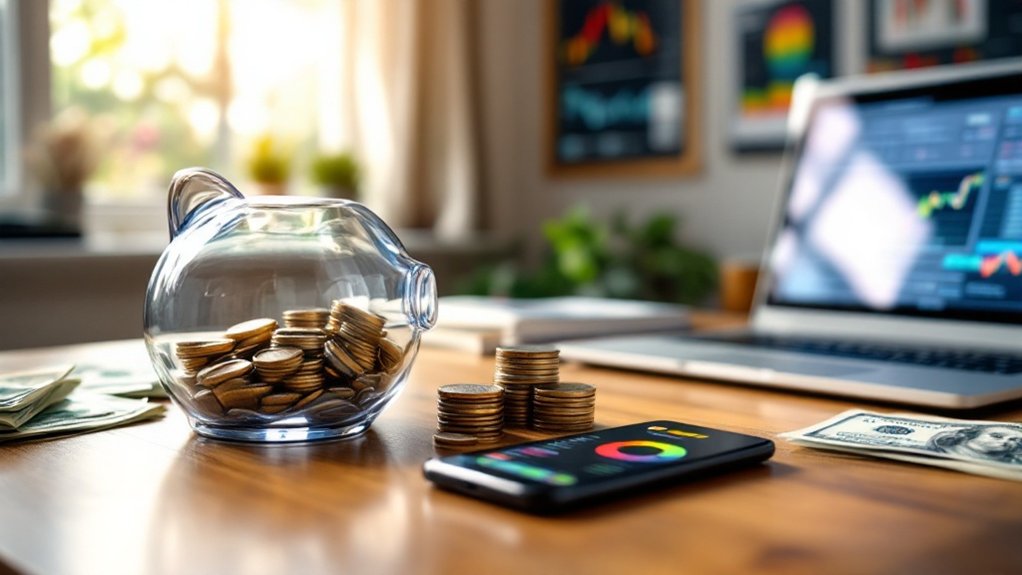Starting a budget requires tracking every penny spent – yes, even that morning coffee. The process begins with calculating take-home pay and listing fixed expenses like rent and variable costs like groceries. Smart budgeters use tools ranging from basic spreadsheets to fancy apps, while setting both short and long-term financial goals. Building an emergency fund comes first, followed by retirement saving and investments. There’s more to discover about making money work harder.

Nearly everyone wants to control their money, but most people don’t know where to start. Creating a budget isn’t rocket science – it’s just a plan that shows income and expenses over time. Simple, right? Well, not exactly. People tend to overcomplicate things, especially when it comes to cash. Using simple tools like spreadsheets helps track spending without feeling overwhelmed.
The first step is brutally honest math. Calculate take-home pay after taxes and deductions. Then track every single penny spent. Yes, even that $4 coffee counts. Fixed expenses like rent and car payments are easy to track – they don’t change much. Variable expenses like groceries and entertainment are trickier. They bounce around like a rubber ball, making them harder to pin down. Reviewing credit card statements regularly helps identify spending patterns.
Setting financial goals is where things get interesting. Short-term goals might mean saving for a new phone or building an emergency fund. Long-term goals? That’s the big stuff – retirement, buying a house, or finally taking that dream vacation. Goals need to be flexible, though. Life happens, and sometimes plans need adjusting.
Smart financial goals flex with life’s changes, balancing short-term wants with long-term dreams like retirement and homeownership.
Different budgeting methods work for different people. Some swear by the envelope system – literally stuffing cash into envelopes for different expenses. Others prefer zero-based budgeting, where every dollar has a job. The pay-yourself-first method? That’s for people who hate seeing money slip through their fingers.
Technology makes tracking easier. Spreadsheets work for the detail-oriented crowd. Budgeting apps automatically categorize expenses and send notifications when spending gets out of hand. Some people still prefer good old-fashioned bank statements. Whatever works.
Saving money isn’t just about hoarding cash under the mattress. Smart savers build emergency funds first – typically 3-6 months of expenses. Then they think about retirement and investments.
Diversification is key – spreading money across different types of investments helps manage risk. The earlier someone starts saving, the more time compound interest has to work its magic. Considering stock market investing can provide significant long-term returns and help protect against inflation.
Frequently Asked Questions
How Can I Stick to My Budget When Unexpected Expenses Arise?
One should maintain a dedicated emergency fund, prioritize essential expenses, adjust discretionary spending when necessary, and use budgeting tools to track and reallocate funds during unexpected financial challenges.
Should I Use Cash or Credit Cards for Better Budget Management?
Using a combination of both methods proves most effective. Cash helps control daily spending through tangible limits, while credit cards offer tracking tools and emergency flexibility when properly managed.
What Percentage of Income Should Go Towards Non-Essential Spending?
Financial experts recommend allocating 30% of income to non-essential spending, following the 50/30/20 rule, though this percentage should be adjusted based on individual circumstances and financial goals.
How Often Should I Review and Adjust My Budget Plan?
Monthly budget reviews are recommended for tracking expenses and income, while quarterly reviews should focus on broader financial goals and necessary adjustments based on changing circumstances.
Which Budgeting Apps Are Most Secure for Tracking Personal Finances?
Mint, Empower Personal Dashboard, and YNAB rank among the most secure budgeting apps, featuring bank-level encryption, two-factor authentication, and strict data protection protocols for personal finance tracking.





